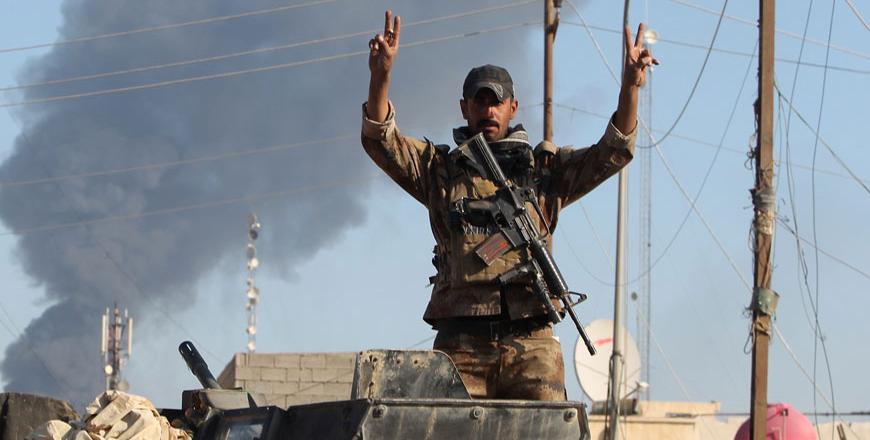You are here
Iraqi army needs Kurds' help to retake Mosul — Zebari
By Reuters - Dec 29,2015 - Last updated at Dec 29,2015

A member of Iraq’s elite counterterrorism service flashes the ‘V’ for victory sign as smoke from a controlled explosion billows in the background on Tuesday on the outskirts of Ramadi, the capital of Iraq’s Anbar province, about 110 kilometres west of Baghdad, after Iraqi forces recaptured it from the Daesh terror group (AFP photo)
BAGHDAD — The Iraqi army will need the Kurds' help to retake Mosul, the largest city under the control of Daesh with the planned offensive expected to be very challenging in a region home to rival religious and ethnic groups, an Iraqi minister said.
Mosul, 400km north of Baghdad, has been designated by the government as the next target for Iraq's armed forces after they retook the western city of Ramadi, the first major success of the US-trained force that initially fled in the face of Daesh’s advance 18 months ago.
Retaking the mostly Sunni city of Mosul would be hard as the local and regional players in northern Iraq have diverging agendas. The region is a mosaic of different ethnic and religious groups lying between Turkey, Syria and Iraqi Kurdistan.
It would effectively mark the end of the “caliphate” proclaimed by Daesh in adjacent Sunni areas of Iraq and Syria, Iraq's Finance Minister Hoshiyar Zebari told Reuters in an interview.
"Mosul needs good planning, preparations, commitment from all the key players," Zebari, a Kurd, said on Monday in Baghdad.
"Peshmerga is a major force; you cannot do Mosul without Peshmerga," he said, referring to the armed forces of Iraqi Kurdistan, an autonomous northern region close to Mosul.
Kurdish forces have positions east, north and west of Mosul while Iraqi security forces backed by Shiite militias have positions in Baiji, south of Mosul.
The city had a population of two million before it fell to the militants in June 2014, in the first stage of their sweeping advance through northern and western Iraq.
The battle of Mosul would be "very, very challenging", Zebari said. "It will not be an easy operation, for some time they have been strengthening themselves, but it's doable."
Given the extent of the area that needs to be secured around Mosul during the attack, the army may also need to draw on local Sunni forces and possibly the Shiite Popular Mobilisation Forces (PMF) in support roles, he said.
The PMF, known in Arabic as Hashid Shaabi, is a loosely knit coalition of mostly Iran-backed Shiite militias set up to fight Daesh. The government sidelined the PMF in the Ramadi battle to ensure air support from the US which is reluctant to be seen fighting on the same side as the Iranian-backed militias.
"Mosul is different from Ramadi," US Army Colonel Steve Warren, spokesman for the Baghdad-based anti-Daesh coalition told reporters on a video conference on Tuesday.
"It's a big, big, big city and it's going to take a lot of effort. It's going to take more training. It's going to take more equipment, and it's going to take patience."
'Final blow'
Prime Minister Haider Al Abadi said on Monday that Daesh would be defeated in 2016 with the army planning to move on Mosul. "We are coming to liberate Mosul and it will be the fatal and final blow to Daesh," he said in speech praising the army's "victory" in Ramadi.
"It's there [Mosul] where Abu Bakr Al Baghdadi declared his caliphate," Zebari said, referring to the group's leader. "It is literally their capital."
The Iraqi Kurdish president, Massoud Barzani, discussed plans for the liberation of Mosul with Lieutenant General Tom Beckett, Britain's senior defence adviser, in September, according to Kurdish TV Rudaw.
Peshmerga forces, backed by US air strikes, in November dislodged Daesh from Sinjar, a town west of Mosul that is home to Iraq's Yazidi minority who suffered at the hands of Daesh when it overran the area in August 2014.
Barzani said at the time the capture of Sinjar "would have a big impact on liberating Mosul", as the Yazidi town lies on the road to Raqqa, Daesh's stronghold on Syrian territory.
Arab Sunnis and
Shiites are concerned that the Kurds could use the battle as a mean to expand the territory under their control, said Wathiq Al Hashimi, chairman of the Iraqi Group for Strategic Studies, a think-tank in Baghdad.
The Kurds are concerned that the Shiites would use their presence to bolster the influence of the central government in Baghdad, he said.
"The Peshmerga's involvement will be inevitable but could further complicate the battle in Mosul if not enough guarantees have been taken from the regional leadership that they will not use it to expand their territories," said Hashimi.
Related Articles
ERBIL, Iraq — It has taken two years of training a demoralised army, and the backing of the air cover and special forces of the world'
BAGHDAD — Iraqi forces may face a big battle near Baghdad before they can try to retake the Daesh stronghold of Mosul: Fallujah, a long-time
US air support and pledges of weapons and training for Iraq's army have raised expectations of a counter-offensive soon against Islamic State (IS), but sectarian rifts will hamper efforts to forge a military strategy and may delay a full-scale assault.


















